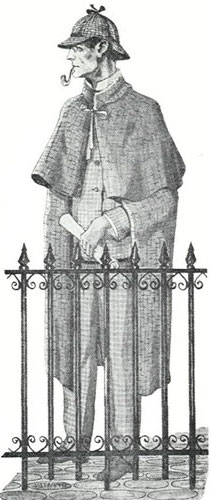
The Adventure of the Proper Comma
Date - Copper/March 1932
The Case
David Benjamin, leader of the Praed Street Irregulars, brings this case to Pons. The Irregulars had been near Dr. Sloan Sollaire’s private sanitarium when a woman had run to the gate and slipped a stone through. The message “HELP, PLEASE” was scratched onto it. A guard quickly took her away and then ran the boys off. Pons emphasizes the proper use of the comma by a woman locked in an asylum and decides to investigate the doctor and his institution.
Quotes
Ø Pons: Tomorrow I will have you incarcerate me in Dr. Sollaire’s sanitarium.
Parker: What? Pons, you aren’t serious!
Pons: I was never more so.
Parker: But it is such a mad scheme!
Pons: Ah, I shall be mad as a hatter, if necessary. I have always had a fondness for Alice’s table companions.
Ø …The following day found Pons up with the sun and about one of his most detestable habits – revolver-practice in the front room which served as our sitting room and study. The crack of his weapon woke me…(Parker’s narrative)
Comments
Ø David Benjamin was the leader of the Irregulars in this tale, set in 1932. Alfred Peake was their leader for The Adventure of the Rydberg Numbers and The Adventure of the Praed Street Irregulars, set in 1925 and 1926, respectively. Apparently there was a change in the organizational structure during that time. Did Alfred move on to better things, or did some ill chance befall him; something surely not uncommon to the street urchins of the day.
Ø It seems that many things could have gone with Pons’ plan to extract Lady Buxton from the sanitarium, resulting in grave danger to the master sleuth. He particularly exposes himself and appears to be quite at the mercy of Dr. Sollaire. Parker strenuously objects to the plan, but his pleas are ignored.
Ø Dr. Gerald Buxton is one of the Pontine Canon’s outstanding villains. He has disposed of two wives in sanitariums and at the time of this tale is working on a third heiress. He is also has a wealthy client list, leading to the conclusion that he was intelligent, suave and handsome. His anger must have been kept hidden from most of society. His undoing is caused because he “went to the well one time too often.”
Ø As occurs in a few other cases, such as The Adventure of the Frightened Baronet and The Adventure of the Circular Room, Parker speculates on the issue of mental health to explain a client’s state. Pons remains unconvinced and his solution ultimately shows that Parker’s medical diagnosis does not account for the happenings of the case.
Ø A scene occurs that harkens back to the famous Baker Street confrontation between Sherlock Holmes and Dr. Grimesby Roylott. An enraged Roylott bends a steel fireplace poker in front of Holmes. After he leaves, Holmes unbends it.
In this adventure, an angered Buxton visits Praed Street, calls Pons a “meddling busybody” and threatens to break him, snatching up a broom and breaking it to make his point.
Pons immediately responds by picking up Bruxton’s cane, snapping it in half and holding out the pieces to Bruxton, adding “Pray, do not forget your stick, doctor.” While Holmes’ feat was a more impressive show of strength, Roylott was gone before it occurred. It conveys Holmes’ stolidness in the face of Roylott’s blustering rage. But it sends no message directly to Roylott. Pons’ action is much more satisfying and leaves the reader applauding his wry, direct response.
Ø Pons seems to be easily accepted into the establishment by Dr. Sollaire. It is conveyed to Sollaire that it may well be a temporary stay, and he is only to be observed and not molested in any way. Either Parker liberally greased Sollaire’s palm up front to gain admittance, or he led the greedy doctor to believe that it might be a longer term, and profitable, commitment.
We learn early on that Sollaire has a questionable reputation and subsequent events certainly would not enhance his standing as a physician. But there is no mention made of whether the doctor faced any repercussions from his actions related to the Lady Buxton. Perhaps he was encountered again in an unreferenced case, or one that Parker did not choose to write up, such as The Adventure of the Muttering Man? One wonders…
Return to Memoirs Home